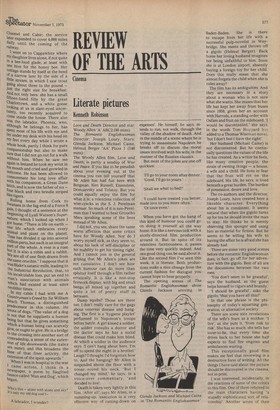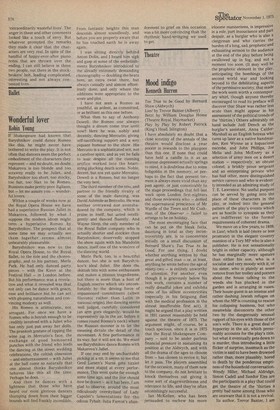REVIEW OF THE ARTS
Cinema
Literate pictures
Kenneth Robinson
Love and Death Director and star: Woody Allen 'A' ABC2 (80 mins) The Romantic Englishwoman Director: Joseph Losey. Stars: Glenda Jackson, Michael Caine, Helmut Berger `AA' Plaza 1 (146 mins) The Woody Allen film, Love and Death, is partly a senclim of War and Peace. If you like to be pseudish about your evening out at the cinema you can tell yourself that Mr Allen has had fun here with Bergman, Ken Russell, Eisenstein, Dostoievsky and Tolstoy. But you could equally enjoy the film for what it is; a relentless collection of wise-cracks in the S. J. Perelman manner. So much of it is neo-Perelman that I wanted to hear Grouch° Marx speaking some of the lines instead of Mr Allen.
I did not, you see, share the same warm affection that some critics have for Woody Allen. Nor do I worry myself sick, as they seem to, about his lack of self-discipline or his inability to get his timing right. And I cannot join in the general griping that Mr Alien's jokes are not cumulative. I don't see how such humour can do more than splutter itself through a film rather erratically. It is like a non-stop firework display, with big and small bangs all mixed up together and quite a lot of pretty stuff in between.
Damp squibs? Those are there too. I don't really care for the gags about venereal disease and hanging. The first is a 'hygiene playlet' performed to Napoleon's troops before battle. A girl kissed a soldier, the soldier consults a doctor and the doctor says he has a social disease that could make him blind. At which a soldier in the audience says: 'I can't hang about here. I'm off to spend the night in a brothel.' Laugh? I thought I'd forgotten how to. And the hanging? Mr Allen is suspended above the floor with a noose round his neck. 'But I changed my mind,' he says, in a voice-over commentary, 'and decided to live'.
Death is taken very lightly in this film, 'After all', says Mr Allen, in a summing-up, 'execution is a very effective way of cutting-down on expenses'. He himself, he says, intends to run, not walk, through the valley of the shadow of death. And in the middle of a scene where he is trying to assassinate Napoleon he breaks off to discuss the moral issues involved with his wife, in the manner of the Russian classics.
But most of the jokes are one-off quickies: 'I'll go to your room after dinner.'
'Good. go to yours.'
'Shall we what to bed?'
'I could have treated you better, made love to you more often.' 'Or once even.'
When you have got the hang of this kind of humour you could go on doing it yourself all the way home. It is like a nervous tick with a nicely-directed film production around it. But in spite of its relentless facetiousness it passes the time very quickly indeed. And one good thing can be said about it. Like the second film I've seen this week, it is literate. Both productions make a nice change from the current fashion for dialogue you cannot hope to hear properly: The opening scenes of The Romantic Englishwoman show Glenda Jackson arriving in Baden-Baden. She is there to excape from her life with a successful pulp-novelist in Weybridge. She meets and throws off a gigolo (Helmut Berger). Back home her loving husband imagines her being unfaithful to him. Soon she is at London airport, absently buying a foreign toy for her child. Does this really mean that she almost forgets the child when she is miles away?
The film has its ambiguities. And they are necessary in a story about a woman who is not sure what she wants. She muses that her life has kept her away from buses since 1959, given her an account with Harrods, a standing order with Oxfam and fruit on the sideboard. 'I would be discontented,' she says. in the words Tom Stoppard added to a Thomas Wiseman novei, 'but I don't feel I have the right'.
Her husband (Michael Caine) is not discontented. But he contin ually questions the values of the life he has created. As a writer he feels, like many creative people, the strain of owning things — a house, a wife and a child. He lives in fear that the fruit will rot on the sideboard. His life, he says, is lived beneath a great burden. The burden of possession, desire and love.
The co-authors and the director, Joseph Losey, have created here a likeable character. Everything about his is consistent. It seems natural that when the gigolo turns up for tea he should invite the man to stay. He thinks he is merely observing this sponger and using him as material for fiction. But he seems to be willing his wife to having the affair he is afraid she has already had.
There are some very good scenes before the romantic Englishwoman does, in fact, go off for her adventure with the gigolo. Best of all are the discussions between the two men.
'You don't seem to be grateful', says the husband, as the guest helps himself to cigars and brandy. 'I should be grateful', asks the gigolo, 'that you have all this?'
In that one phrase is the philosophy of today's squatting generation, or alternative society.
There are some nice revelations of the wife's fears as a mother. 'I live', as she puts it, 'from risk to risk'. She has so much, she tells her lover-to-be, that every time she drives back to her house she half expects to find fire engines and ambulances waiting.
This exceptionally good film makes me feel that reviewing is a destructive form of writing. All the things I have said about the picture should be discovered in the cinema, not in print.
I was interested, incidentally, in the reactions of some of the critics to this film. One of them referred to the main characters having 'a stupidly sophisticated sort of relationship'. Another wrote of their `extraordinarily wasteful lives'. The anger in these and other comments looked like a touch of envy. But whatever prompted the remarks they made it clear that the characters are very real. In spite of the handful of happy-ever-after piano notes that are thrown over the ending, I can still believe in these two people, out there in the stockbrokers' belt, leading complicated, interesting and not always contented lives.

































 Previous page
Previous page